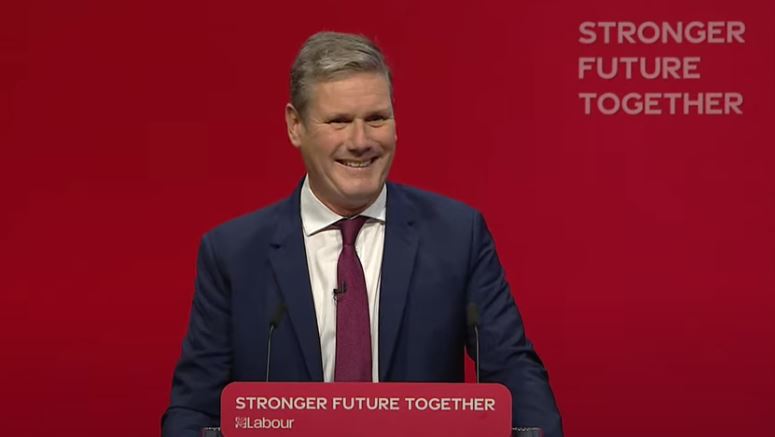The leader may have appeased neoliberals and corporate grandees but that will not help to build a good society or a sustainable economy.

Prem Sikka is an Emeritus Professor of Accounting at the University of Essex and the University of Sheffield, a Labour member of the House of Lords, and Contributing Editor at Left Foot Forward.
The UK has deep-rooted social problems – poverty inequalities, social exclusion and an economy that does not deliver for the many. Some 14.5 million people, including 8.1 million people in working families and 4.5 million children live in poverty. Wages have been stagnant for the last decade.
The richest 10% of households hold 44% of all wealth. The poorest 50% own just 9%. The poorest fifth of society has only 8% of the total income. The top fifth has 40%.
The government continues to hit the less well-off. It is reducing the Universal Credit payments meant to help the less well-off by £1,040 a year. This change alone may result in 100,000 people being evicted from their homes.
Normal people have to wait a long time for hospital treatment. In England, waiting list for hospital treatment has ballooned from 2.5 million in 2010 to 5.6 million in July 2021. Many will die waiting.
Millions more will rely upon foodbanks to enable them to survive. School children will go hungry. Some 3.18 million households in England are in fuel poverty and this winter many will die from cold.
Such a landscape requires the Labour Party to distinguish itself from the ruling Conservative party, but the Labour party conference in Brighton was largely a policy-free zone.
In April 2020, Sir Keir Starmer was elected leader of the Labour Party on the back of 10 pledges which promised “radical” policies and “socialism”. Just before the conference, Labour leader Sir Keir Starmer published his long-awaited essay titled “The Road Ahead”. This vacuous document avoids any mention of “socialism” or “redistribution”.
Minimum wage failure
One way of lifting people out of poverty is to increase the national minimum wage. The current main minimum wage rate of £8.91 an hour is inadequate. The Conservative government has promised to raise it to £10.50 an hour by 2025.
In 2019, Sir Keir supported striking workers at McDonald’s, saying: “They’re not asking for the Earth, they’re asking for the basics – £15 an hour. The right to know their hours in advance and trade union recognition. It will be the norm if we have a Labour government.”
But in 2021, Sir Keir ordered his shadow employment secretary to oppose the £15 minimum wage and call for £10 an hour wage after the 2024 general election. He refused and promptly resigned.
The conference delegates voted in favour of a £15 per hour minimum wage. The leader’s U-turn was the last straw for one trade union. After a 119 year affiliation with Labour Party, the Bakers’ Food and Allied Workers Union severed its links with the Labour Party.
Nationalisation of energy
Sir Keir’s leadership pledge number five says: “Public services should be in public hands, not making profits for shareholders. Support common ownership of rail, mail, energy and water; end outsourcing in our NHS, local government and justice system”.
The UK is facing massive price rises in energy, supply uncertainties and there are queues at petrol stations, so it is a good time to consider ending profiteering, provide relief for hard-pressed families and restore focus on security of long-term supplies.
The UK has around nine terawatt hours of stored gas reserves equivalent to just 2% of the annual demand, compared to 168 terawatt hours in Italy, 151 in Germany, 117 in France, 75 in the Netherlands and 49 in Austria.
Against this background, Sir Keir announced that he would not nationalise the big six energy firms. The same afternoon, conference delegates rejected the leader’s statement and voted to nationalise energy firms.
Pensions and Taxation
The government’s neglect of senior citizens has presented a perfect opportunity for Labour to enrol them, especially as a large number have traditionally voted for the Conservative Party.
At 29% of average earnings, the UK state pension is the worst in the developed world. The Netherlands pays 100.6%, Portugal 94% per cent, and Italy 93.2%. The average weekly state pension is £155.08, less than half the minimum wage.
The government has suspended he triple-lock on the state pension, introduced in 2011. Despite the triple-lock, some 2.1 million retirees live in poverty and over 1.3 million are undernourished. Yet Labour leadership did not offer any policies to alleviate pensioner poverty.
Progressive taxation is a way of redistributing income and wealth and funding public services. Yet the UK has a regressive system.
The poorest 10% of households pay 47.6% of their income in direct and indirect taxes, compared to 33.5% by the richest 10% of the households. The recently announced 1.25 percentage point increase in national insurance contributions (NIC) will further skew this burden as the poor will pay a greater proportion of their income in NIC.
Once again, Labour leadership offered no policies for reversing regressive taxation.
The Labour leadership has spurned an opportunity to enrol and give hope to the less well-off, retirees and hard-pressed households. It has jettisoned previous promises which inevitably raise more questions about the leader’s honesty and sincerity.
The leader may have appeased neoliberals and corporate grandees but that will not help to build a good society or a sustainable economy.
To reach hundreds of thousands of new readers we need to grow our donor base substantially.
That's why in 2024, we are seeking to generate 150 additional regular donors to support Left Foot Forward's work.
We still need another 117 people to donate to hit the target. You can help. Donate today.



